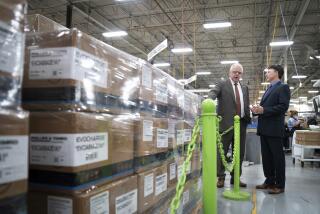Rick Perry calls global warming an unproven, costly theory
- Share via
Reporting from Bedford, N.H. — Texas Gov. Rick Perry on Wednesday reaffirmed his view that global warming is an unproven scientific theory that has been advanced, at least in part, by scientists who have “manipulated data,” and he argued that programs intended to limit climate change are costing the nation “billions if not trillions” of dollars that he believes could be better spent elsewhere.
“We are seeing almost weekly, or even daily, scientists are coming forward and questioning the original idea that man-made global warming is what is causing the climate to change,” Perry told an audience of several hundred voters, business leaders and local officials who gathered for a breakfast in Bedford. “Yes, our climate’s changed — they’ve been changing ever since the Earth was formed.”
Without citing his sources, Perry added that the cost of implementing what he called “anti-carbon programs” is billions of dollars: “I don’t think, from my perspective, that I want America to be engaged in spending that much money on what is still a scientific theory that hasn’t been proven, and from my perspective is more and more being put into question.”
Perry expressed his skepticism about global warming during his debut at the Politics & Eggs series, a virtually mandatory event for presidential candidates in the state that holds the first primary each election cycle.
One of his questioners was Jim Rubens, a Republican from the village of Etna who works as a consultant for the Union of Concerned Scientists. Rubens prefaced his question by reading statements from Perry’s book “Fed Up!” that global warming is “a contrived phony mess that is falling apart under its own weight.”
Rubens, an investor who works in the clean-energy sector, asked Perry how he reconciled those views and his assertion that the Earth is “experiencing a cooling trend” with findings that fossil fuel combustion is the primary cause of global warming and that Earth surface temperatures have risen above the 20th century average every month since the mid-1980s.
If both “observed scientific data” and the National Academy of Sciences are wrong on the issue, Rubens asked Perry, “doesn’t that call into question the entire science discovery process that is the basis for America’s status as an advanced technological society?”
“You may have a point there,” Perry quipped, adding that he believed the issue had become politicized. Without citing any specific examples, the Texas governor charged that “there are a substantial number of scientists who have manipulated data so that they will have dollars rolling into their projects.”
His opinions put him at odds with the vast majority of experts. The United Nations Intergovernmental Panel on Climate Change, made up of more than 2,500 scientists, found with 90% confidence that recent warming was caused by humans. Its conclusion is supported by years of accumulated scientific data. The U.N. has warned that there is so much carbon dioxide and other greenhouse gases in the atmosphere that even if concentrations held at current levels, the effects of global warming would continue for centuries.
Rubens said later in an interview that Perry was promulgating inaccurate information that could damage the reputation of the National Academy of Sciences. “I hope he would review the temperature data, and say, ‘I was wrong; it is getting warmer.’ ”
Republican front-runner Mitt Romney has faced criticism from some conservatives who share Perry’s skepticism on climate change. The former Massachusetts governor maintains that the Earth is getting warmer and that humans have contributed to that rise in temperatures.
At his events, Romney often adds a caveat that he’s not sure of the extent to which humans contribute to that warming, but that he would like to reduce emissions of greenhouse gases that he says “may” be a cause of the warming trend.
Another GOP presidential candidate, former Utah Gov. Jon Huntsman Jr., has also come under fire for his backing of climate change initiatives.







